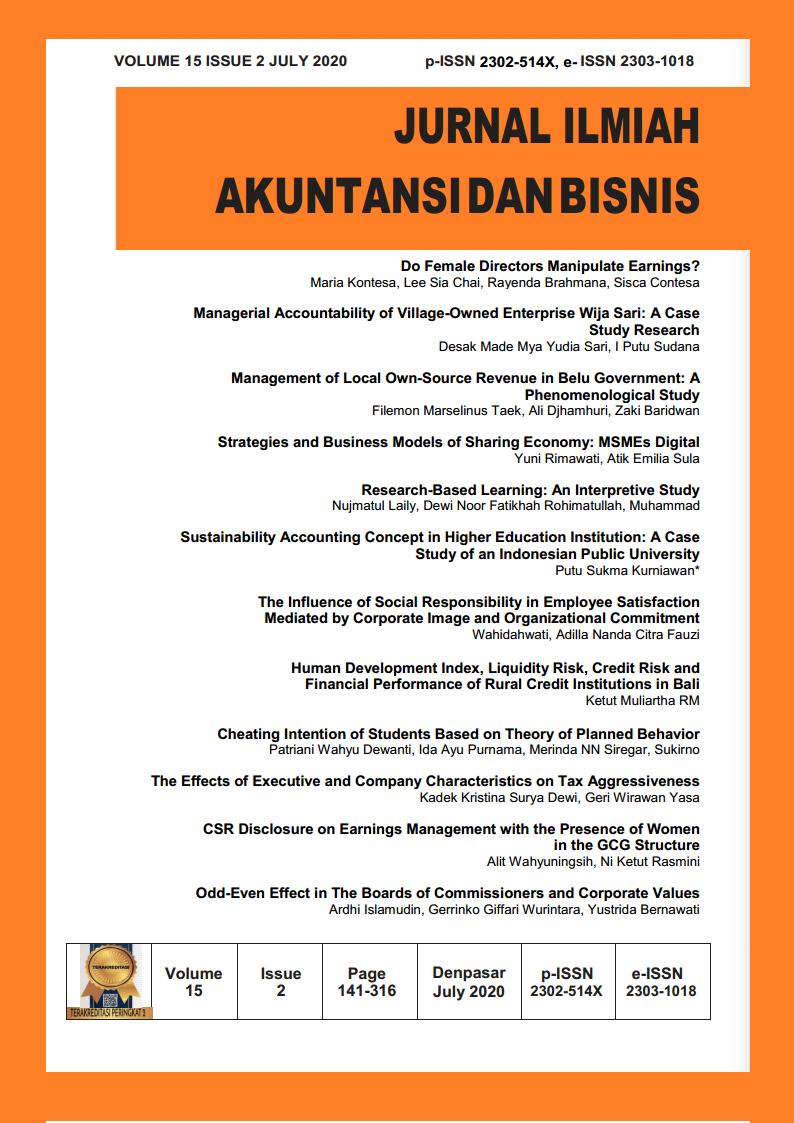The Odd-Even Effect in The Boards of Commissioners and Corporate Values
Abstract
This article expands the understanding of board of commissioners' characteristics by introducing the concept of the odd-even effect in their structure. The study employs a quantitative research approach to explore this phenomenon. When a board of commissioners is composed of an odd number of members, the decision-making process tends to be more straightforward and efficient due to the absence of tie votes, leading to a more unified perspective. In contrast, an even-numbered board is prone to voting ties, which can introduce diverse viewpoints and potential conflicts in decision-making. Consequently, the composition of the board, whether odd or even, significantly impacts corporate value. Boards with fewer members tend to be more effective, with companies having odd-numbered boards generally exhibiting higher corporate value compared to those with even-numbered boards.
Keywords: corporate value, odd-even effects, board of commissioners.
Downloads
References
Campbell, K., & Vera, A. M. (2010). Female board appointments and firm valuation: Short and long-term effects. Journal of Management & Governance, 14(1), 37–59.
Chung, K. H., & Pruitt, S. W. (1994). A simple approximation of Tobin’s q. Financial Management, 23(2), 70–74.
Damayanthi, I. G. A. E. (2019). Fenomena Faktor yang Mempengaruhi Nilai Perusahaan. Jurnal Ilmiah Akuntansi Dan Bisnis, 14(2), 208–218. https://doi.org/10.24843/JIAB.2019.v14.i02.p06
Darmadi, S. (2013). Do women in top management affect firm performance? Evidence from Indonesia. Corporate Governance: The International Journal of Business in Society. https://doi.org/10.2139/ssrn.1728572
Deng, X., Gao, H., & Liu, W.-L. (2012). Voting Efficiency and the Even-Odd Effects of Corporate Board: Theory and Evidence. https://doi.org/10.2139/ssrn.2112880
Eisenhardt, K. M. (1989). Building theories from case study research. Academy of Management Review, 14(4), 532–550.
Gao, H., & Huang, J. (2018). The even--odd nature of audit committees and corporate earnings quality. Journal of Accounting, Auditing & Finance, 33(1), 98–122.
Hamdani, M. (2016). Good Corporate Governance (Gcg) Dalam Perspektif Agency Theory.
Harmono, D., & Si, M. (2009). Manajemen Keuangan Berbasis Balance Scorecard. Pendekatan Teori, Kasus dan Riset Bisnis. Jakarta: Bumi Aksara.
He, W., & Luo, J. (2018). Agency problems in firms with an even number of directors: Evidence from China. Journal of Banking & Finance, 93, 139–150.
Hemastuti, C. P., & Hermanto, S. B. (2014). Pengaruh profitabilitas, kebijakan dividen, kebijakan hutang, keputusan investasi dan kepemilikan insider terhadap nilai perusahaan. Jurnal Ilmu & Riset Akuntansi, 3(4), 1–15.
Jensen, M. C., & Meckling, W. H. (1976). Theory of the firm: Managerial behavior, agency costs and ownership structure. Journal of Financial Economics. https://doi.org/10.1016/0304-405X(76)90026-X
Masulis, R. W., Wang, C., & Xie, F. (2012). Globalizing the boardroom—The effects of foreign directors on corporate governance and firm performance. Journal of Accounting and Economics, 53(3), 527–554.
Muryati, N. N. T. S., & Suardikha, I. M. S. (2014). Pengaruh Corporate Governance Pada Nilai Perusahaan. E-Jurnal Akuntansi, 9(2), 425–429. https://ojs.unud.ac.id/index.php/Akuntansi/article/view/9160
Oxelheim, L., & Randøy, T. (2003). The impact of foreign board membership on firm value. Journal of Banking & Finance, 27(12), 2369–2392.
Prabowo, M., & Simpson, J. (2011). Independent directors and firm performance in family controlled firms: evidence from Indonesia. Asian-Pacific Economic Literature, 25(1), 121–132.
Rasyidah, R. (2013). Perbandingan Corporate Governance dengan SistemOne-Tier Board di Inggris dan AS Terkait EfektififasPencegahan Terjadinya Fraud dalam Korporasi. Global & Policy, 1(1), 11–18.
Schellenger, M. H., Wood, D. D., & Tashakori, A. (1989). Board of Director Composition, Shareholder Wealth, and Dividend Policy. Journal of Management. https://doi.org/10.1177/014920638901500308
Sudiyatno, B., & Puspitasari, E. (2010). Tobin’s q dan altman z-score sebagai indikator pengukuran kinerja perusahaan. Kajian Akuntansi, 2(1).
Tambunan, M. C. S., Saifi, M., & Hidayat, R. R. (2017). Pengaruh Good Corporate Governance Terhadap Nilai Perusahaan (Studi pada Perusahaan Sub Sektor Food and Beverages yang Terdaftar di BEI Tahun 2012-2015). Jurnal Administrasi Bisnis, 53(1), 49–57.
Tricker, R. I. B., & Tricker, R. I. (2015). Corporate governance: Principles, policies, and practices. Oxford University Press, USA.
Ullah, I., Fang, H., & Jebran, K. (2019). Do gender diversity and CEO gender enhance firm’s value? Evidence from an emerging economy. Corporate Governance: The International Journal of Business in Society, 20(1), 44–66. https://doi.org/10.1108/CG-03-2019-0085




















